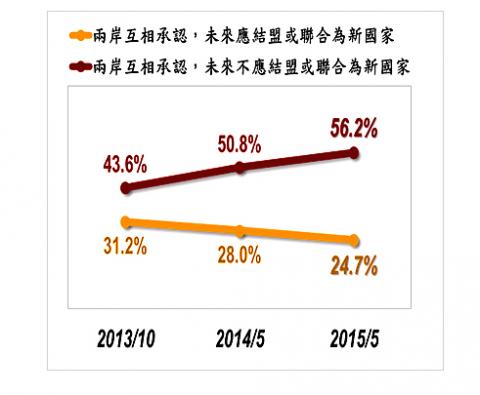More than 60 percent of respondents disagreed with Chinese Nationalist Party (KMT) Chairman Eric Chu’s (朱立倫) comment that “both sides of the Taiwan Strait belong to ‘one China,’” a poll released yesterday by Taiwan Indicators Survey Research showed, while only 26.7 percent agreed with the statement.
Chu made the comments during a meeting with Chinese President Xi Jinping (習近平) in Bejiing on May 4. Chu later said that the “one China” he spoke of referred to the Republic of China (ROC), not the People’s Republic of China (PRC).
Asked whether Taiwan and China belong to “one China,” 61.6 percent of respondents opposed the idea, 26.7 percent were in favor and 11.7 percent said they had no opinion on the matter or were neutral, the poll showed.

Image provided by TISR
The survey showed that 41.2 percent of respondents said that the talks in Beijing were more favorable to China, while 15.7 percent said they favored Taiwan.
The poll asked: “In the event of Taiwan and China mutually recognizing each other as rightful governments, should both sides enter into an alliance as two nations or merge and become a single country?”
Among respondents, 56.2 percent opposed an alliance, while 24.7 percent supported the idea and 19.1 percent said they had no opinion on the matter.
An analysis of the poll results showed that among pan-blue supporters, 47.5 percent opposed an alliance, while 42.7 percent supported the notion.
When asked who among Chu, Legislative Speaker Wang Jin-pyng (王金平) and Vice President Wu Den-yih (吳敦義) — seen as potential KMT nominees for next year’s presidential election — would best preserve Taiwanese sovereignty, prioritize Taiwan’s safety and maintain cross-strait relations, Wang was ranked No. 1 by 36.9 percent of respondents, Chu was backed by 26.5 percent and Wu by 4.9 percent, while 12.8 percent said that none of the three would meet their expectations, 1.3 percent said all three were up to the task and 17.6 percent did not respond or said they did not know.
The survey was conducted on Monday and Tuesday.
It collected 1,004 valid samples from people aged 20 or above. It has a margin of error of 3.1 percentage points.

NATIONAL SECURITY THREAT: An official said that Guan Guan’s comments had gone beyond the threshold of free speech, as she advocated for the destruction of the ROC China-born media influencer Guan Guan’s (關關) residency permit has been revoked for repeatedly posting pro-China content that threatens national security, the National Immigration Agency said yesterday. Guan Guan has said many controversial things in her videos posted to Douyin (抖音), including “the red flag will soon be painted all over Taiwan” and “Taiwan is an inseparable part of China,” while expressing hope for expedited “reunification.” The agency received multiple reports alleging that Guan Guan had advocated for armed reunification last year. After investigating, the agency last month issued a notice requiring her to appear and account for her actions. Guan Guan appeared as required,

Japan and the Philippines yesterday signed a defense pact that would allow the tax-free provision of ammunition, fuel, food and other necessities when their forces stage joint training to boost deterrence against China’s growing aggression in the region and to bolster their preparation for natural disasters. Japan has faced increasing political, trade and security tensions with China, which was angered by Japanese Prime Minister Sanae Takaichi’s remark that a Chinese attack on Taiwan would be a survival-threatening situation for Japan, triggering a military response. Japan and the Philippines have also had separate territorial conflicts with Beijing in the East and South China

A strong cold air mass is expected to arrive tonight, bringing a change in weather and a drop in temperature, the Central Weather Administration (CWA) said. The coldest time would be early on Thursday morning, with temperatures in some areas dipping as low as 8°C, it said. Daytime highs yesterday were 22°C to 24°C in northern and eastern Taiwan, and about 25°C to 28°C in the central and southern regions, it said. However, nighttime lows would dip to about 15°C to 16°C in central and northern Taiwan as well as the northeast, and 17°C to 19°C elsewhere, it said. Tropical Storm Nokaen, currently

PAPERS, PLEASE: The gang exploited the high value of the passports, selling them at inflated prices to Chinese buyers, who would treat them as ‘invisibility cloaks’ The Yilan District Court has handed four members of a syndicate prison terms ranging from one year and two months to two years and two months for their involvement in a scheme to purchase Taiwanese passports and resell them abroad at a massive markup. A Chinese human smuggling syndicate purchased Taiwanese passports through local criminal networks, exploiting the passports’ visa-free travel privileges to turn a profit of more than 20 times the original price, the court said. Such criminal organizations enable people to impersonate Taiwanese when entering and exiting Taiwan and other countries, undermining social order and the credibility of the nation’s